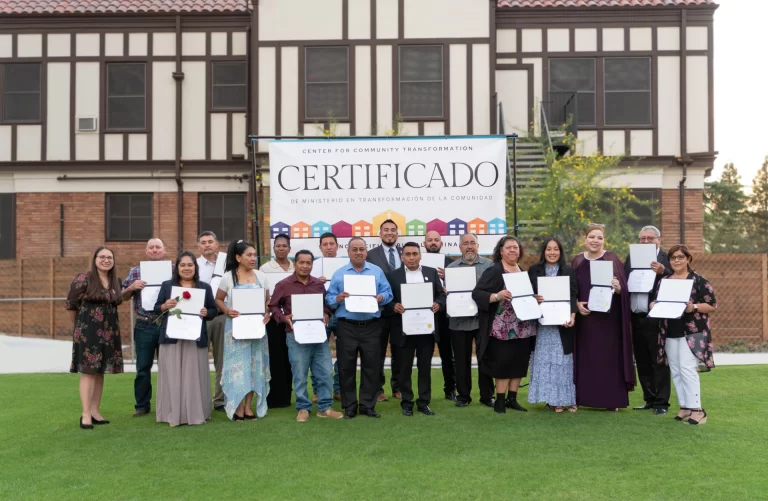The Center for Community Transformation is pleased to announce its annual Faith-Rooted Social Business Plan Contest. With unemployment wreaking havoc in the fabric of our community, this contest is designed to stimulate creativity as well as new partnerships between faith leaders in church, non-profit and traditional business institutions in the area of social business models for youth and adults with barriers to employment. We hope to catalyze the skills sets of people of faith in addressing the most basic of human needs in our community – adequate, meaningful employment. Proposals will be entertained for small business ideas, training systems or employment services.
The Rules
- Each business plan will be submitted by an entry team. An entry team can be one person or a number of people and has no limit on size. The entry team creates the business plan but is not necessarily the entire management team of the business.
- Members of local (Central Valley) Christian churches or faith-rooted non-profit or community benefit organizations are eligible to submit a proposal. Special care is to be taken to identify the biblical foundation of specific gospel values, objectives, ethics leading to the intended social impact. The proposal must also outline the proposed relationship between the business and the faith organization (i.e., will it be under the leadership of the organization? Will it be owned/led by an individual entrepreneur but support the organization? Describe. Etc.)
- Should the business plan reach the finals, at least one member of the entry team must be present at the final judging panel. The panel is a major factor in determination of the winner, so we encourage key team members to be present. Winners will be announced and make a presentation at a special gathering.
- Proposals will be reviewed and judged by a panel of business people and FPU business professors. The decisions of the judges as to the finalists and winners are final. The Center for Community Transformation reserves the right not to name any winners if, in the sole discretion of the staff and the judging panels, none of the entries have sufficiently met the competition objectives.
- All business plan proposals are to be submitted using the CCT template (see below or download). Email to the Center for Community Transformation by September 30, 2017. Send a pdf to cctfresno@gmail.com.
- All winners agree to send a representative to the SCORE Simple Steps to Starting Your Business class (six sessions – fee is paid by the CCT). Award is given after completion of SCORE class.
- If upon receiving an award the social business has not launched within 12 months, the award will be returned in full to the CCT.
The Social Business Plan Template
Click on the link for a downloadable template.
Social Business Plan Template 2017b
For contest submission, provide a significant paragraph or two of response to each category.
1) Executive Summary: one paragraph
- Whom do you serve?
- What do you provide?
- Why is this business needed?
- What is your mission?
- What social impact will you make?
- How will it be sustained?
2) Enterprise Governance
- What ownership structure will serve you best (Sole proprietor, partnership, LLC, corporation, L3C, 501(c)3, S-corp, B-corp)
- What church or organization is connected? How will this further their mission?
- Who is responsible for the company? For the social impact?
- Who will you find to advise the business? How often will they be involved?
3) Human Capital Needs
- How many people are needed?
- What skills do they need?
- Can you use labor to make a social impact?
4) Financial Capital Needs
- What are your startup costs? (List them, with dollar amounts)
- What are your monthly fixed costs (utilities, salary, advertising, interest, rent, depreciation)?
- How much will you need to sell each month to cover your costs (break even)?
- How will you use the initial investment or Spark Tank award?
- What other funding sources will you use?
5) Operational Capital Needs
- What buildings, equipment, vehicles, computers, software, and tools do you need?
- Who can supply some of these?
6) Market Analysis
- Who are your customers? How many of them are there in your servable area?
- What value will you provide to your customers through your product/program/service?
7) Competitor Analysis
- Who are your competitors? How is your company different from them?
- What other ways are your customers meeting their needs? How is your solution better?
8) Operations
- How will you go about operating the business?
- Which tasks will you handle in-house, and which will you outsource?
- Each process maps to your company’s mission and values.
9) Marketing and Sales Activities
- How will you sell? How will the transaction take place? How will you collect money?
- How will you promote the business? How will you customers hear about you?
- What can your church or organization add to your marketing efforts?
10) Social Impact Assessment and Evaluation
- What social impact will your business have or what constituency will it serve?
- How will you measure your social impact?
- What is the Biblical basis for your social impact?
11) Risk Assessment
- What are the biggest risks to your business?
- Identify any key assumptions you’ve made.
- What can keep you from reaching your business’s goals? How will you plan for this?
12) Conclusion
- Two sentences
- Why will a business achieve your goals better than a charity or non-profit?





